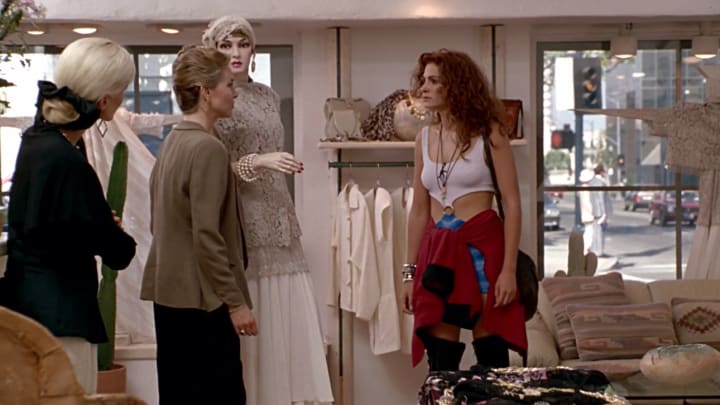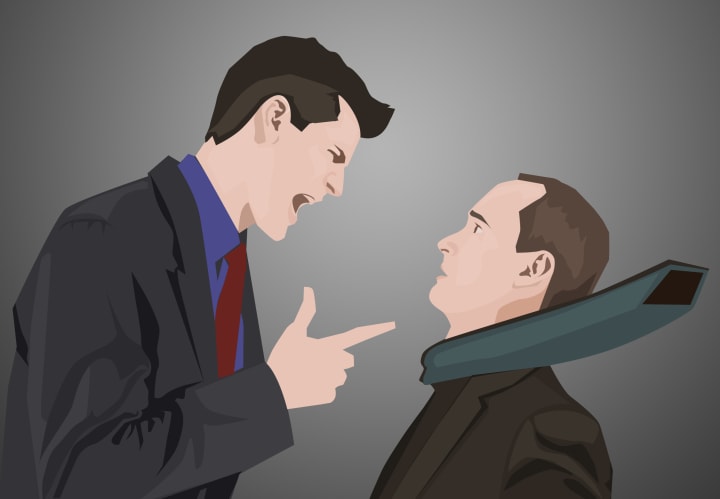Tactics Salespeople Use to Make You Buy Things You Don't Need (And How to Counter Them)
Stop being sold, and start buying wisely.

When I was shopping for my last car, I drove to multiple dealerships before I found the convertible that I eventually bought. This is a common occurrence among shoppers who want to get a decent deal - even when it has nothing to do with cars.
At the first dealership I went to, the salesperson approached me, saying, "Please don't look at me like that, I'm not here to scam you. How can I help you?"
Whether I had realized it or not, I had given him a look not unlike what a deer may give a hunter. Like many people, I was terrified of being approached by salespeople because I didn't want to be pressured into buying something I didn't want.
The reason for the wariness isn't unjustified. Salespeople are trained to sway, pressure, and wheedle people into buying things they don't need. Here's how to counter the worst tactics they use...
Reciprocity

Did you ever notice how many salespeople will offer you coffee, give you a tour, or hand out small tokens of "potential customer appreciation?" It's not done out of goodwill. Those little gestures they do are meant to butter you up and make you feel like you need to reciprocate.
Why It Works:
Whether we like it or not, we're socialized (or even born) with the idea that we have to reciprocate nice gestures. And, this means that if a salesperson is nice to you, that you'll most likely feel compelled to do something nice for them.
This technique is backed by science, and it's so hard to break away from that feeling that you "owe" them a sale.
How To Fight It:
Much of this comes down to controlling the inner dialogue you have. You may have to remind yourself that you don't owe anyone a sale, and that you're not required to reciprocate their gestures. You might also want to remind yourself that this is a sales technique - not a friendship gesture.
If you're really feeling guilty, don't accept any nice gestures they offer, and you won't feel guilty.
Spotlighting

Have you ever had a group of people pressure you into doing something by having all of them looking at you expectantly at the same time? Or worse, have you ever had people just look at you expectantly without saying anything?
It's not a comfortable feeling, and that's actually the point of them giving you those looks.
Why It Works:
Most of us have a general idea of what people want us to do when they look at us expectantly, even if they don't say it. When we feel those eyes on us, we're wired to feel like we should please those people.
There's a number of reasons why spotlighting people work, people-pleasing tendencies aside. The most obvious reason is because it makes us uncomfortable and because we often don't want to "ruffle feathers" in a way that would make things even more awkward. Moreover, no one wants to feel like they fall below expectations - even if it's something idiotic. Lastly, it also is an effective guilt trip, even if it's a subtly done technique.
How To Fight It:
The easiest way to fight it is to close your eyes when you say no to their sales pitch. If you don't see them giving you that look, it's easier to pull yourself away from those vibes.
Of course, practice makes perfect here - and learning to say no is crucial to being able to survive. The more you say "no," the easier it becomes to stand your ground.
Snobbery

A common trope that you can see in real-life stores is the inclusion of snobby salespeople pushing expensive goods. Believe it or not, the snobbiness is actually on purpose. Studies show that stores where sales staff are arrogant or rude tend to get better sales.
Why It Works:
No one wants to feel rejected, especially by people who are actually supposed to be helping us shop. So, the most common kneejerk reaction is to try to "impress" the sales associate into being more polite...and hopefully buy their approval.
How To Fight It:
Some sales staff will be rude because they don't want to deal with time-wasters - and to a point, that's a blessing in disguise. If they don't want to deal with you, you don't have to worry about hearing their sales pitches.
However, if you do have to buy goods at the store, your best bet is to go in with knowledge on what you want to buy and to silence the snootiness by wearing clothing that looks expensive.
If they are still rude, take it to corporate. It will make them tremble in fear of you.
Upsells

This sales tactic is most commonly recognized when you hear a fast food worker ask you if you "want fries with that." Basically, this tactic is all about getting you to add more goods onto what you already buy.
Why It Works:
For some of us, it's second nature to want to upgrade. It's just that simple.
How To Fight It:
Simply put, all you need to do is say "No." Or, if you're more polite, "Not right now."
Most of the time, the salesperson will be understanding and just drop the subject. After all, you don't really hear people from McDonald's giving you a hard sell on fries.
However, some won't take no for an answer. In this case, your best bet is to get curt with them by saying, "Excuse me, I have already said no. Please ring up my goods, and stop pushing me to buy more."
If they still don't let up, ask them if you need to leave the premises to find an associate who will let you buy only what you need to buy. They will relent - guaranteed.
If the upsell tactic tends to strike a nerve in your shopping addiction bone, your best choice is to bring a shopping list on your trips. More often than not, it helps solidify your ability to say "no" when presented with other goodies you could buy.
Using Others To Get To You

This technique is insidious, and it's one that works scarily well in two totally different industry sectors: insurance and child-related goods. Here's how both industries use this technique in different yet equally devastating ways.
With insurance salesmen looking for a sale on life insurance, they will guilt trip you using the futures of your family members. This is why many salesmen will get emotional during their spiels and ask you, "How can you expect your children to go on living without you?"
Toy companies, day camps, and even those hokey child "modeling agencies" actually work on a similar note. However, instead of making you feel bad over serious matters, they try to sell their products to kids knowing that the kids will likely give their parents hell over not getting them the product.
Why It Works:
Our loved ones are our weak points - and they know it. By appealing to them and their wellbeing, salespeople know that saying no to their product will make you feel bad.
Or, in the case of kids, they know that kids who have tantrums are kids that parents want to shut up. And, they also know that caving into the kids' demands will work.
How To Fight It:
Both at least partially rely on guilt to work. So, recognize these tactics as manipulation techniques. And get angry. They're trying to manipulate you, and to make things even worse, they're using your loved ones to get to you. That's not cool - and once you realize what it is, you'll be very likely to say no.
With kids, it may be a good idea to use these moments as a teaching tool that they can't always get what they want. If they continue to throw fits over toys, it may also be a smart idea to discipline them until they learn manners. After all, learning how to behave and handle these things is a part of life's many lessons.
The Ticking Clock

Ever notice how every single sale you ever hear of begs you to "buy before it's too late?" This tactic is all about creating a sense of urgency, and many salespeople on dealership lots will take it the extra mile and tell you that they need an answer right now.
Why It Works:
The reason they do this isn't because they have other buyers lining up for their products. It's because they know that they're making it seem like an urgent matter, and that will squeeze you into buying out of fear.
How To Fight It:
If it's a day-long sale without salespeople badgering you into buying it, make an informed decision by researching things ahead of time. Is it really that good a deal? Moreover, do you really need this thing? If you can't say yes to both questions, skip it.
But, what if it's a salesman who's telling you that they can't guarantee that a car will be available when you get back? Ask to be given a day to think it over - and be prepared to walk away if they aren't willing to give you time (and a contract) to look over.
The Campout

Ever notice how long people end up waiting at a dealership? Or, if you've been sat through a "free presentation" in order to get a "free" vacation, have you ever noticed how long the salespeople talk? This isn't a coincidence.
Why It Works:
This sales tactic basically relies on people being unable to politely extricate themselves from verbal handcuffs. As a result, people who are too nice to say no or people who feel awkward about having to walk away while people are still talking will feel "stuck" until they just agree to pay whatever it is.
Additionally, by making you wait to hear the entire sales spiel, they are forcing you to invest your time in that potential purchase. Since we tend to value things that we spend time on more than those that are quick and convenient, it also sways us on a subconscious level.
Lastly, the Campout also works by wearing down our defenses if we really do want to buy what they're offering. After 5 hours or so of waiting, it's only normal for people to sigh and say, "I don't care what price it is, just give me the damned car!"
How To Fight It:
Set a time limit and stick to it. If they try to badger you into staying longer, tell them that you only had 20 minutes to yourself, and that you'll be taking your leave. Do not allow them to try to negotiate your staying.
Better still, leave without a word. Free yourself, even if they don't want to let you leave.
If you're in the unfortunate situation of having this happen with a door-to-door salesman, tell him that you will be calling the police for a trespasser if he doesn't leave immediately. If he tries to argue, pick up the phone and dial the non-emergency line. He has no right to be on your property once you have made it clear you want him to leave.
Bait And Switches

Very unethical businesses may try to lure consumers by claiming that they have certain products that they really don't have - or that they're giving away products for free. Once customers are in the door, the salesperson may say that the product in question "ran out."
But, hey, surprise! They have another product that's better - and totally not what you wanted at all. Or, they do have that product, but they may have forgotten to mention that it's no longer free...
Why It Works:
The reason that this works is because it got customers to their sales floor, and in reality, that was the primary objective. They never had the product they offered in the way they were initially offering it to you, but if you had known that, you wouldn't have done business with them.
How To Fight It:
Tell them that you want that product at the price that it was promised, and make a point to tell them how disappointed you are in their unethical take on sales. If they can't offer it to you, leave.
It's also worth noting that "bait and switch" techniques aren't always legal and can be reportable offenses to the local Better Business Bureau. In many cases, you can actually sue companies for doing this - or even get them shut down.
Intimidation

Sometimes, bullying doesn't stop at playgrounds. Almost everyone has seen salespeople who have yelled at customers, refused to leave them alone, or browbeat others into doing what they say.
Why It Works:
The reason why intimidation works is because it's terrifying and people don't want the bullying to continue. It's obvious, isn't it?
How To Fight It:
This kind of sales tactic is actually illegal in many industries - including stock brokering and debt collections. Moreover, even if it isn't illegal in a certain sector, the majority of companies that employ these tactics are scammers.
Much like with schoolyard bullying, dealing with these business bullies involves fighting back. Tell them that you're not going to allow them to speak to you that way. If you feel threatened, call the police.
Phone sales people and collections agents have laws barring them from this kind of behavior. If you read up on harassment laws and FERPA, you might find that this is a court-worthy offense.
Lies

Ever notice how salespeople tend to just fudge the truth a bit? For example, that car that you want to buy might have bad gas mileage, but the salesman might tell you that it's the best in it's class. Or, they may prattle on about celebrity endorsements.
Usually, you have a feeling you're being misled, but it's only when someone else tells you how bad it is that you really feel the burn of this tactic.
Why It Works:
Salespeople may prey on people who aren't educated and trust them. It's not right, and it's not fair, but if we don't know any better, how can we possibly make an educated decision?
No one wants to admit they were made a fool of, so if you got sold something under lies, you probably won't want to return it out of shame.
How To Fight It:
The best way to fight this is to educate yourself before you walk in, and keep an eye out for conflicting statements. If you feel you're being lied to, your best bet is to leave.
About the Creator
Cato Conroy
Cato Conroy is a Manhattan-based writer who yearns for a better world. He loves to write about politics, news reports, and interesting innovations that will impact the way we live.






Comments
There are no comments for this story
Be the first to respond and start the conversation.